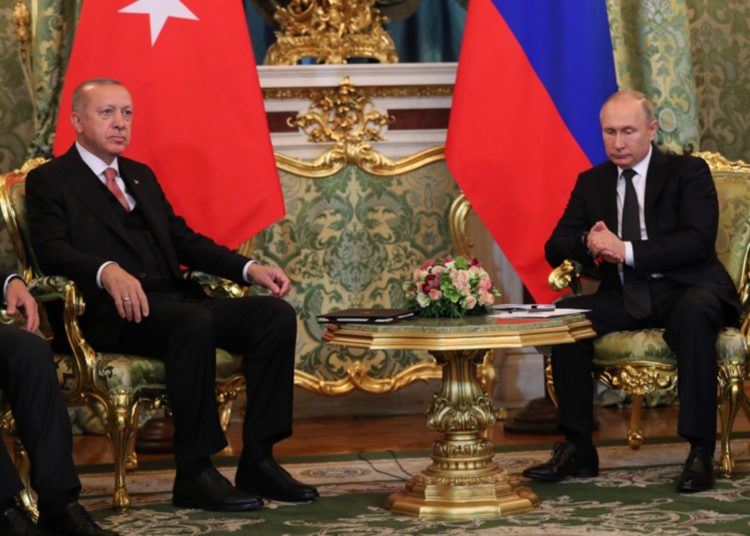Nordic Monitor
Russia has turned up the heat on Turkey, with Russian President Vladimir Putin accusing the government of President Recep Tayyip Erdoğan of turning Idlib into a hotbed of jihadists who use the Syrian province as a springboard to move into other countries.
Speaking at a joint press conference before a meeting with French President Emmanuel Macron at Fort de Brégançon in France on August 19, 2019, Putin said: “We will certainly talk about Syria. I would like to note that before the corresponding agreements were signed in Sochi, as the president said now, on the demilitarization of part of the Idlib zone, about 50 percent of that territory was under terrorist control, and now that figure is 90 percent.”
He added that “we are observing constant raids from there, and more than that, we are seeing the movement of militants from that region to other parts of the world, and this is extremely dangerous.”
At the press conference Putin implicitly accused Turkey of allowing terrorist groups in Idlib to “increase their control over the demilitarized zone” and of providing an atmosphere in which “militants feel comfortable operating.”
The latest developments confirm the secret agreement between Ankara and Moscow that was reported by Nordic Monitor on August 8. According to the agreement Russia allowed militia supported by Turkey to attack US-backed Kurdish fighters in Syria in exchange for Turkey abandoning Idlib. Turkey agreed to withdraw its troops and military equipment from Idlib in accordance with the deal.
However, the implementation of the deal appears to have hit a snag, and Moscow, by raising its criticism of the Erdoğan government in recent days, is signaling that it may have to resort to other options to clear out the last holdout of jihadist groups in Syria.
Turkey’s plan of resettling radical groups who are forced to leave Idlib in northern Syria was also exposed by the Nordic Monitor report. At the press conference Putin also touched, implicitly, on Turkey’s intention to “use” them in other parts of Syria.
In fact, four days before a Syrian armed forces attack targeting a convoy of Turkish military forces, on August 15, Russian Foreign Ministry Spokesperson Maria Zakharova announced that the Sochi memorandum should not be used as an excuse “to protect and shield the terrorists that were qualified as such by the UN Security Council” and asked Turkey to “abide strictly by its commitment.” Zakharova also reiterated Russia’s position on northern Syria, which is based on restoring Syria’s sovereignty in the region and excluding Kurdish autonomy in Syria.
Despite the diplomatic message of the Russian Foreign Ministry, Turkey has sent a significant number of tanks and troops deep into Syria in an apparent bid to reinforce the town of Khan Sheikhun. However, Turkish troops that crossed the southern border into Idlib province were stopped by Russian and Syrian forces early Monday. Both then reminded Turkey of its commitments and officially exposed Turkey’s support for radical militants in Idlib.
The latest military operations and diplomatic revelations have shown the level of pressure on Turkey to withdraw its troops and military equipment from Idlib.
The Turkish president has repeatedly threatened to launch a new offensive in the region east of the Euphrates River in northern Syria in an effort to remove Kurdish People’s Protection Units (YPG) from its southern border. His main goal is to try to create a corridor along hundreds of kilometers of the Syrian border. On August 5, the leaders of Turkish-backed opposition groups (Free Syrian Army [FSA], FRA) said 14,000 people are ready to join the Turkish forces who might launch an operation east of the Euphrates.
Turkey is intent on galvanizing the Syrian rebel units it works with to fight the YPG. It successfully did this in Afrin in 2018. It has continued the military training of rebels since then. Besides the FSA, Erdoğan also wants to benefit from the Hay’at Tahrir al-Sham (HTS) militia in Idlib for a new offensive in the region east of the Euphrates in northern Syria.
Idlib is the only large region in Syria that is still controlled by illegal armed groups. In May 2017 Russia, Turkey and Iran, the three partners of the Sochi process, agreed to establish de-escalation zones in Deraa, Eastern Ghouta, Homs and Idlib. Turkey did not volunteer to assume any responsibility in the first three de-escalation zones but was interested in Idlib. In the same year, a northern de-escalation zone was set up in Idlib to give shelter to militants and their families.
When the Syrian government prepared to launch an Idlib offensive, the Russian and Turkish presidents met in Sochi, on September 17, 2018, and their talks resulted in an agreement to establish a demilitarized zone in Idlib, which was to be 15 to 20 kilometers deep. Under that deal Turkey deployed forces in Idlib at a dozen positions around the rebel-controlled northwestern province, where it has set up observation posts to prevent an escalation between Syrian government forces and rebels.
However, Turkey was accused of being too soft on and supporting HTS. It was Turkey’s responsibility to prevent those groups from conducting attacks on Syrian soil. In the months since the agreement was signed, Idlib has been taken over by HTS militants, and it has become one of the strongest militant groups in northern Syria. Today, HTS largely controls Idlib province, including the provincial capital and the border crossing with Turkey at Bab al-Hawa.
Turkish presidential spokesperson Ibrahim Kalın said on Wednesday that Turkey, Russia and Iran will have a trilateral summit in Ankara on September 16 to discuss the developments in Syria.












